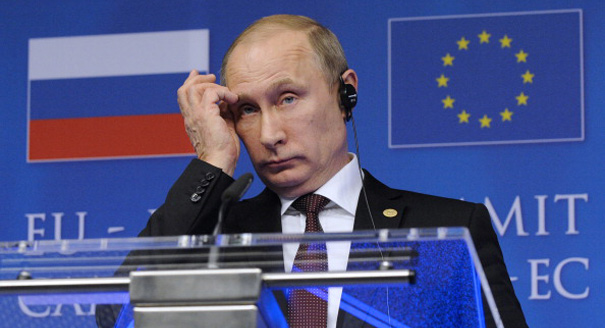Bad diplomacy is always an option in the EU, and there is no expiration date for stale ideas in this union of 28. Never has this been more obvious than in the stunning announcement issued in The Hague on March 31 by German Foreign Minister Frank-Walter Steinmeier, his Dutch counterpart Bert Koenders, and European Council President Donald Tusk, the essence of which is both a very bad joke and a potential geopolitical nightmare for Europe.
It is, of course, a sensation. On April 6, the day of the Dutch referendum on the EU’s Association Agreement with Ukraine, an emergency EU-Russia summit will be held, the first since such gatherings were suspended in 2014. To add insult to injury, the summit will be hosted in Minsk by Belarusian President Alexander Lukashenko, one of Russia’s most loyal vassals in Eastern Europe and arguably Europe’s last bona fide dictator.
If observers thought this was already bad enough, they were proved wrong just minutes later when it was confirmed that the summit is the result of weeks of wheeling and dealing behind the scenes by former German chancellor Gerhard Schröder. Schröder, whose close personal ties to Russian President Vladimir Putin are legendary, seems to have worked on a clandestine mandate from Steinmeier, with the silent consent of German Chancellor Angela Merkel.
Brussels insiders say that Tusk was dumbfounded when he found out. “It was dropped on him just like the Turkey deal [on refugees] was dropped on him,” said one commentator. “He almost freaked.”
Why Tusk did not resign on the spot became clear last night when the Polish side of the deal was unveiled. At first, Polish Prime Minister Beata Szydło had been vehemently opposed to any diplomatic rapprochement between the EU and Russia. But on Thursday evening, Schröder allegedly passed her a personal note from Putin saying that the Kremlin had agreed to grant a seat on the board of Nord Stream AG to a “very senior Polish statesman.” Rumor has it that former prime minister Jarosław Kaczyński has agreed to accept the position, which is said to be remunerated rather lavishly. The Polish government and Tusk, whose hands were tied, demurred through clenched teeth, but their relationship with Merkel is bound to suffer after this snub.
So what will be talked about at the emergency extravaganza in Minsk? If you want geopolitical vertigo to hit you real hard, listen to Russian Foreign Minister Sergei Lavrov: “The government of the Russian Federation will bring to Minsk a far-reaching proposal concerning a new, reinforced security architecture for Europe. It will fully take into account the natural power balance of our shared continent. It will constructively redefine the sovereign rights of both the protectors and the protected. It will be inclusive in previously unthinkable ways, and it will be free of any of the false vetoes and ahistorical entanglements that have stood in the way of comprehensive peace for so long.”
“Did you hear that? He said ‘entanglement.’ Can you believe that?” shouted Douglas Lute, U.S. ambassador to NATO, over the phone on Friday morning. “He quotes George Washington’s Farewell Address and doesn’t even go red in the face!” Lute was busy all last night explaining the position of the administration of U.S. President Barack Obama on the surprise summit. Obama himself, unlike U.S. Secretary of State John Kerry, had obviously been informed about the ongoing negotiations. The president was “not amused” but decided not to intervene.
Obama did, however, consult his predecessor, George W. Bush, on how to handle Schröder-style rogue diplomacy and its implications. He then decided to send Kerry to Poland during the summit, to be on standby in one of NATO’s nifty new forward-deployed coordination cells near the Belarusian border, ready to fly to Minsk at short notice if called on. The U.S. State Department has so far been unavailable for comment.
How inclusive the EU-Russia summit will really be is demonstrated by the fact that the Ukrainian leadership will not even be invited to Minsk. Spitefully, President Petro Poroshenko’s spokesman tweeted that his boss would instead be touring the Dutch cities of Zaandam, Wormerveer, Purmerend, and Volendam on April 6, campaigning for a yes vote in the Dutch referendum, which could prove fateful for his country. “We have real issues 2 discuss w/ the great people of the Low Lands & no time 4 diplomatic con artistry,” read the Ukrainian spokesman’s dry comment.
But the pinnacle of summit cynicism must be the announcement that there will be a side program at the meeting during which leaders will engage with several Belarusian civil society organizations. Among them are a local Montessori school in Minsk, known to be a hotbed of alternative thought in Belarus, and, at Putin’s special request, a local food safety NGO that received a Carnegie Foundation peace award in 1994.
Can a think tanker resign in protest? Is that common practice anywhere on the planet? Or would that just be the laughable act of a court jester with inflated ideas about his own importance? What can be done to stop this sellout? How can this monstrous mistake be undone before it puts stability in Europe at risk? And why is the Brussels scene so silent as the continent’s once-beautiful integration project continues to slip further toward ever-grosser union?
The only consolation is that, for once, we at Carnegie Europe knew about the summit earlier than the elite cadre of foreign correspondents in town, all of whom were too busy devouring pizza at La Brace restaurant in Brussels last night. Or is it really true that a story can’t be news if Peter Spiegel didn’t know about it first?






